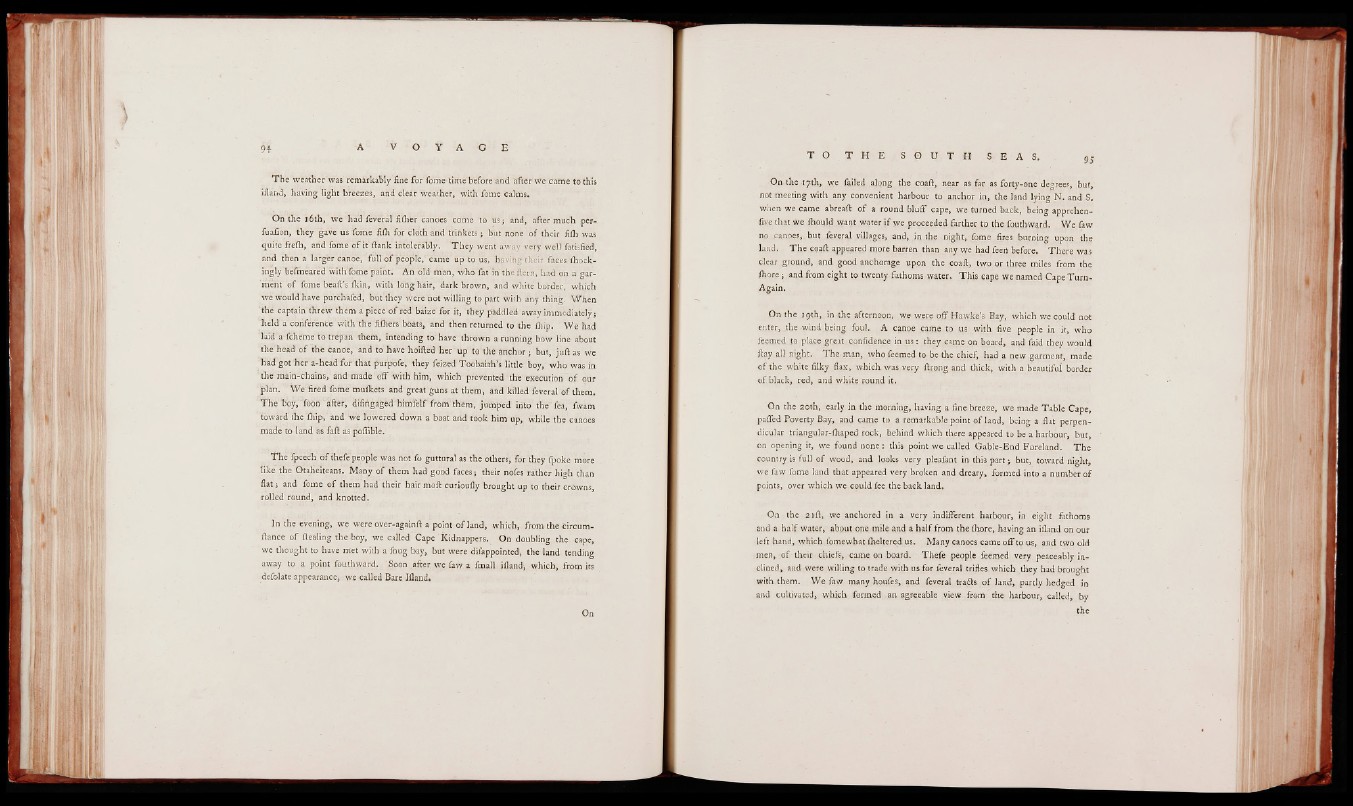
The weather was remàrkàbly fine for Tome time before and after we came to this
iiland, having light breezes, and cleár weather, with fome calms.
On the 16th, we had feveral fifher canoes come to us; and, after much per-
fuafion, they gave us fome fiih for cloth and tritikets ; but none of their fiih was
quite frefh, and fome of it flank intolerably. They went away very well fatisfied,
and then a larger canoe, full of people,' came up to us, havihg their faces fhock-
ingly beÎmèarëd withTome paint. An old man, who fat in the flern, had on a garment
of Tomé beaíl’s fkin, with long hair, dark brown, and white border, which
we would have purchafed, but they were not willing to part with any thing. When
the captain threw them apiece of red baize for it, they paddled away immediately ;
held a Conference with the fiihers bùàts, and then returned to the fhip. ’ We had
laid a fcheme to trepan them, intending to have thrown a running bow line about
the head of the canoe, and to have hoifted her tip to the anchor; but, ju'ft as we
had got her a-headfor that purpofe, they feized Toobaiah’s little boy, who was in
the main-chains, and made off with him, which prevented the execution of our
plan. We fired fome mufkets and great guns at them, and killed feveral of them.
The boy, Toon after, difihgáged: himtelf frôm them, jumped into the Tea, Twam
toward the fhip, and we Towered down a boat and took him up, while the canoes
made to land as fail as poflible.
The fpeech of thefe people was not fo guttural as the others, for they fpoke more
like the Otaheiteans. Many of them had good faces ; their nofes rather high than
flat ; and fome of them had their hair moil curiouily brought up to their crowns
rolled round, and knotted.
In the evening, we were over-againil a point of land, which, from the circum-
ilance of ilealing the boy, we called Cape Kidnappers. On doubling the cape,
we thought to have met with a fnug bay, but were difappointed, the land tending
away to a point fouthward. Soon after we faw a fmall iiland; which, from its
defolate appearance; we called Bare Iiland.
On
On the 17th, we failed along the coail, near as far as forty-one degrees, but,
not meeting with any convenient harbour to anchor in,, the land lying N. and S.
when we came abreail of a round bluff cape, we turned back, being apprehen-
five that we ihoujd wapt w-ater if we proceeded farther to the fouthward. We faw
no canoes* but feveral villages, and, in.the night, fome fires burning upon the
land. The coail appeared more barren than any we had feert before. There was
clear ground, and good anchorage upon the coail, two or three miles from the
fhore; and from eight to twenty fathoms-water. This cape we named CapeTurn-
Again.
On the 19th, in the afternoon, we were off Hawke’s Bay, which we could not
enter, the wind being foul, A canoe came to us with five people in it, who
feemed to place great confidence in us: they came on board, and faid they would
flay all night. The man, who feemed to be the chief, had a new garment, made
of the white filky flax, which was very ilrong and thick, with a beautiful border
of black, red, and white round it.
On the 20th, early in the morning, having a fine breeze, we made Table Cape,
paffed Poverty Bay, and came to a remarkable point of land, being a flat perpendicular
triangular-ihaped rock, behind which there appeared to be a harbour, but,
on opening it, we found none: this point we called Gable-End Foreland. The
country is full of wood, and looks very pleafant in this part; but, toward night,
we faw fome land that appeared very broken and dreary, formed into a number of
points, over which we cpuld fee the back land.
On the 2 til, we anchored in a very indifferent harbour, in eight fathoms
and a half water, abput one. mile and a half from the ihore, having an iiland on our
left hand, which fomewhat iheltered us. Many canoes came off to us, and two old
men, of their chiefs, came, on board. Thefe people feemed very peaceably inclined,
and were willing to trade with us for feveral trifles which they had brought
with them. We faw many hgiifes, and feveral tradls of land, partly hedged in
and cultivated, which formed an agreeable view from the harbour, called, by
the